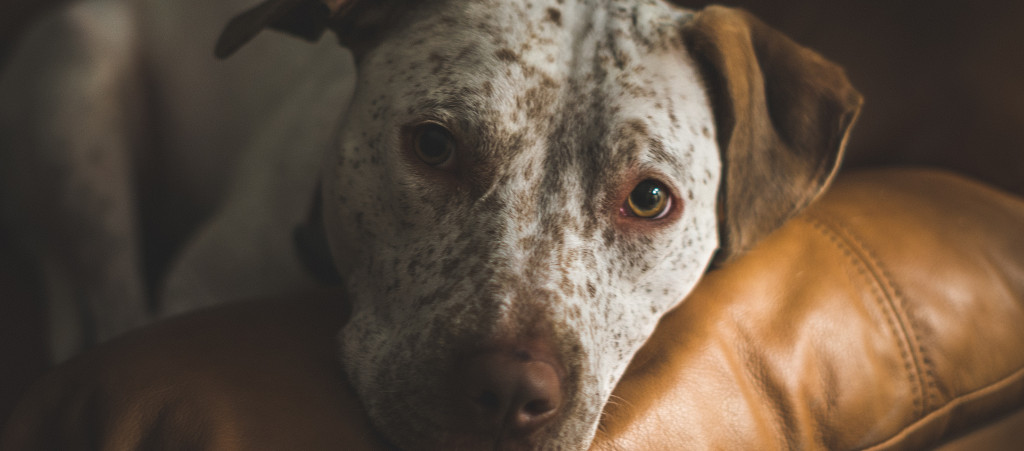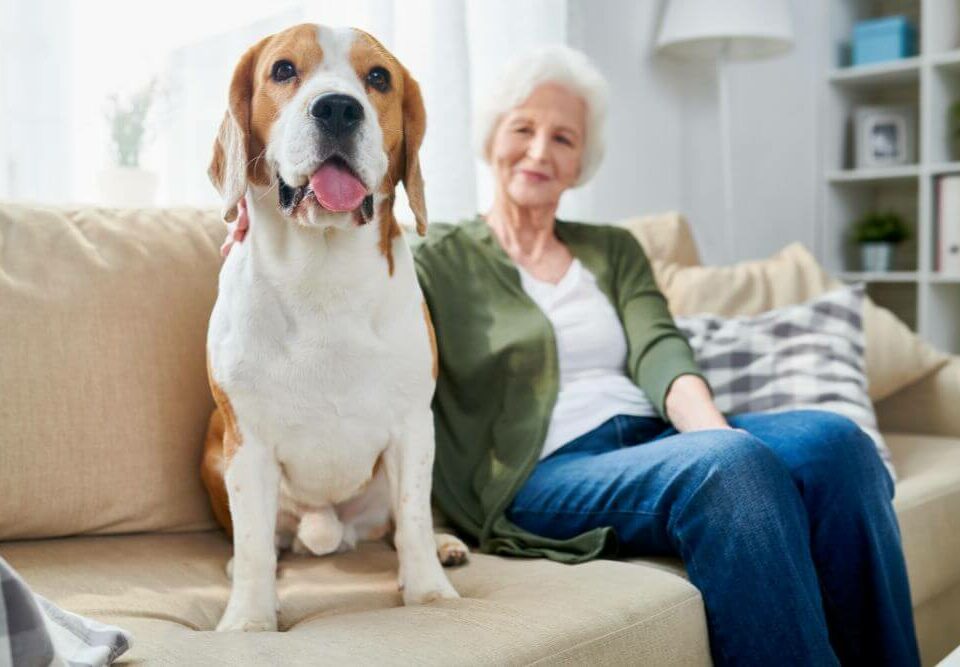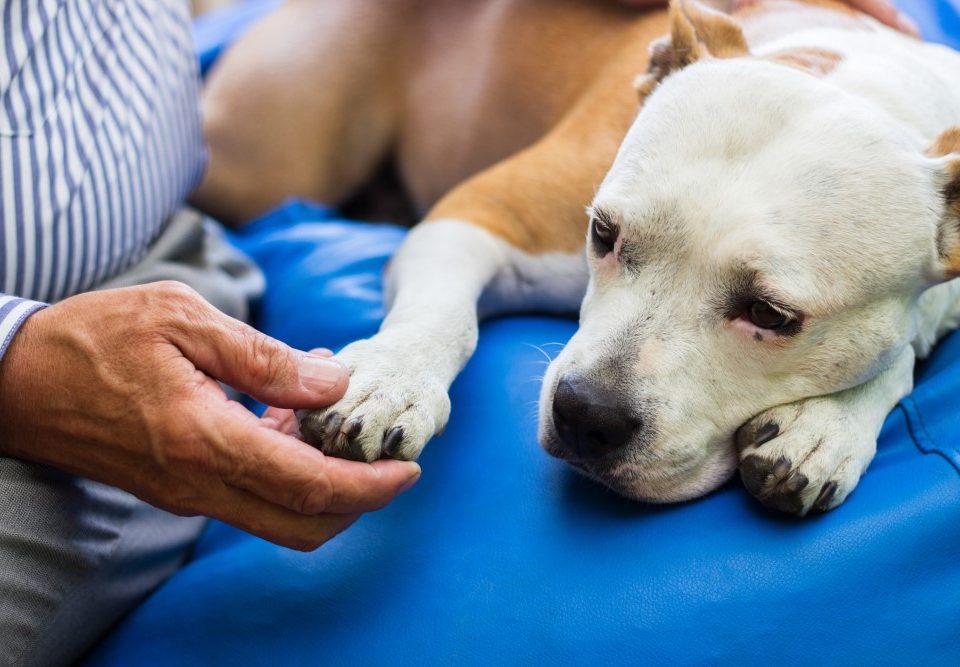
Dog Brain Tumor When To Euthanize
July 1, 2021
Dog Kidney Failure – When To Euthanize
July 19, 2021
Dog dementia – When dog euthanasia is the right choice? Never an easy subject for dog-lovers and dog-owners, but the subject of ‘when is it time to put down a dog with dementia‘ is an agonising one which needs to be asked at some stage. As dog owners, we are heavily burdened with the conscious and legal ability to humanely end a dog’s life.
Even though one does not have to struggle through and watch their pet suffer indefinitely, as one would with human beings, the decision of when to end your pet’s life is made difficult because you cannot ask your pet whether its preference is to live or to die and, if the latter, the means by which its life is taken away.
Dog dementia is an insidious and unstoppable condition that is very difficult for a dog to handle.
It can also be extremely difficult for you to deal with if you are the person who loves the dog.
Here are some signs to look for if you have concerns about your dog’s mental and emotional health:
Pacing, anxiousness and disorientation;
Staring for long periods of time:
Getting lost in corners and seeming to be lost in familiar places
Peeing and/or pooping in the house:
Senior dogs with dementia may forget to go outside to do their business, but it’s important to rule out another medical problem such as a urinary tract infection, gastrointestinal problems, bowel problems, etc. before assuming the problem is related to dementia.
Withdrawal from familiar people and places:
This could be as simple as ignoring familiar and beloved people. More specifically, a dog with dementia often won’t seek out human companionship, sometimes it will even walk away while being petted, and often won’t greet family members when they come home
Barking for no reason on a regular basis:
The dog is in constant confusion and this may cause fear which leads to barking. It may no longer recognise once familiar people, or get trapped behind a door left ajar and not realise that all it has to do is use a little force to free itself. Appetite changes, which can be both loss of appetite or increased hunger.
Sleeping pattern changes:
Watch for behaviour like sleeping during the day and being awake and confused at night
Not responsive to your voice:
Rule out hearing loss first.
Any other behaviours that might be unusual for your dog:
On noticing any of the above signs, it’s best to keep a log or a mental note of how often they are happening and monitor whether they are worsening. For senior dogs starting to show signs of unusual behaviour, then the first step would be to take it to the vet. If the vet diagnoses it with Canine Cognitive Dysfunction (CCD), dog dementia, then this can be absolutely heart-breaking for you as the owner. It doesn’t always have to be a question of dog dementia and when to put down the dog because there are ways of treating the symptoms and stabilising the condition rather than taking giant steps.
The vet may well prescribe some medications which can be helpful for the dementia in its early stages. However, you should know that some medications only aid with calming anxiety. This means you may end up with a confused, barely responsive and tranquilised dog which means you are trading one unhealthy state for another.
Early Stage Treatments
If you do opt for some early-stage treatment options, then here are some possibilities which the vet may prescribe:
Omega-3 fatty acids:
Consider switching your dog to a diet rich in omega-3 fatty acids and other antioxidants. These acids help the dog with brain function and alertness.
Selgian/Anipryl:
Consult with your vet about this option. The ingredient Selegiline hydrochloride is effective for dementia in dogs by prolonging the activity of your dog’s remaining dopamine. This improves memory and helps dogs think more clearly.
CBD oil:
This is proving a new and exciting alternative to drugs for many pet owners. Not only is it effective for anxiety but for serious conditions including epilepsy. It is legal to purchase at many pet stores and high street stores, Holland and Barrett.
How to calm a dog with dementia at night?
Canine dementia can lead to restlessness during the night due to a disturbance in the usual sleep-wake cycle, causing confusion and anxiety. Sundowning is another condition that may affect dogs with dementia; as the evening approaches, symptoms worsen, leading to increased agitation and disorientation. In addition, they might experience the need to urinate more often or endure pain and discomfort, both of which can add to their restlessness.
Can I help my dog with dementia sleep better at night? – One option is to make their sleeping area cozy with a familiar bed and soft blanket. Another idea is to use calming music or white noise to ease their anxiety and encourage peaceful rest.
There are some natural remedies you can try: Lavender and chamomile essential oils can have a calming effect on dogs, and diffusing these oils or using them in a spray can help create a relaxing environment. Melatonin is a great natural supplement to help your dog relax. You can try giving your dog a small amount of melatonin, which can help regulate sleep.
Can a consistent routine help calm my dog with dementia at night? – Keeping a consistent bedtime and wake-up time, as well as adhering to the same feeding and exercise schedule each day, can help reduce their anxiety and confusion. By doing so, your furry friend will feel more at ease and secure in their surroundings.
How long can a dog live with dementia?
Regrettably, there is no remedy for canine cognitive dysfunction and the ailment will deteriorate progressively. Nevertheless, with appropriate care and supervision, dogs suffering from dementia can survive for a few months to several years. It is crucial to collaborate closely with your vet to devise a course of action and ensure that your beloved pet has the highest quality of life attainable in order to keep them contented and comfortable as they age.
How do you know when to put a dog with dementia to sleep?
Following the treatments above, if your dog’s condition worsens over a prolonged period of time, then your vet may be able to help you decide when to consider dog euthanasia.
One thing which is vital for you to assess before you make this decision is whether you feel like this is the time for your dog to go.
- Does your dog still engage with you?
- Is there still ‘life’ in its eyes, or do they just stare at you blankly?
- Is the dog constantly living in fear and barking?
- Does it have a healthy appetite, good energy levels, is it of good mental condition?
These are all questions that you should be asking yourself at this stage. One option is palliative care, however in the long run, you may not find this sustainable.
When to Consider Euthanasia for your Dog with Dementia?
It is a difficult decision to make, but some signs that it may be time to consider euthanasia for a dog with dementia include a decline in quality of life, loss of appetite, inability to control bodily functions, and increased confusion and anxiety.
Once you have arrived at the decision to euthanise your dog, then your vet will explain to you in good detail what the procedure entails. They will also discuss your wishes for aftercare arrangements and cremation. The vet may also provide sedation for your pet prior to the procedure to minimize anxiety.
When you are ready, your vet will administer the euthanasia solution through an IV line. Your pet will not experience any discomfort with this injection and will not be aware of any feelings of distress. First, the solution rapidly induces a brief state of anaesthesia. Within a few more seconds, the solution will cause the heartbeat and breathing to cease. Your vet will ensure they finish by listening for a heartbeat with the stethoscope. So, you need not worry about the completeness of the euthanasia. It is customary at that point for the vet to leave the room for you to grieve in private.
Dog dementia. When dog euthanasia is the right choice?






